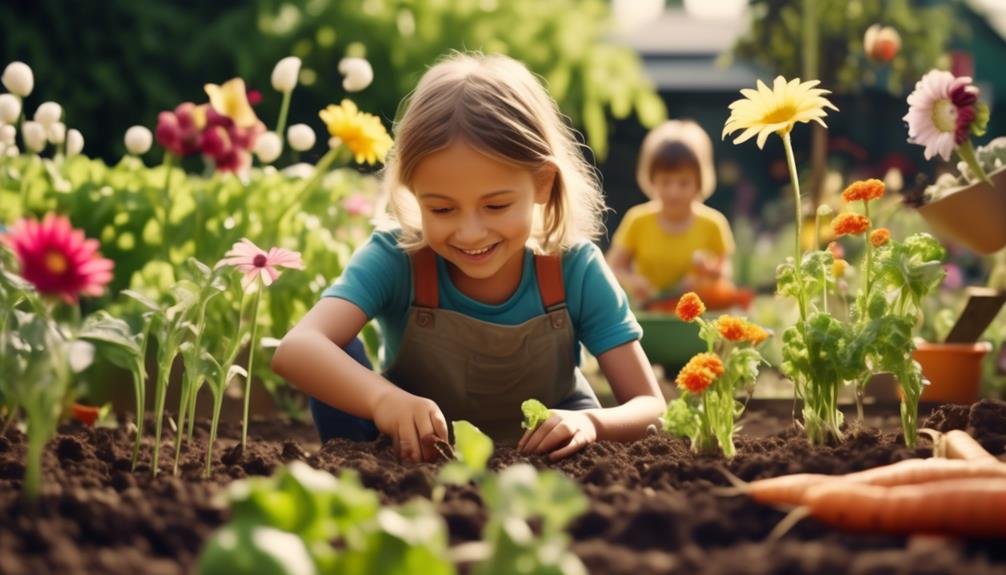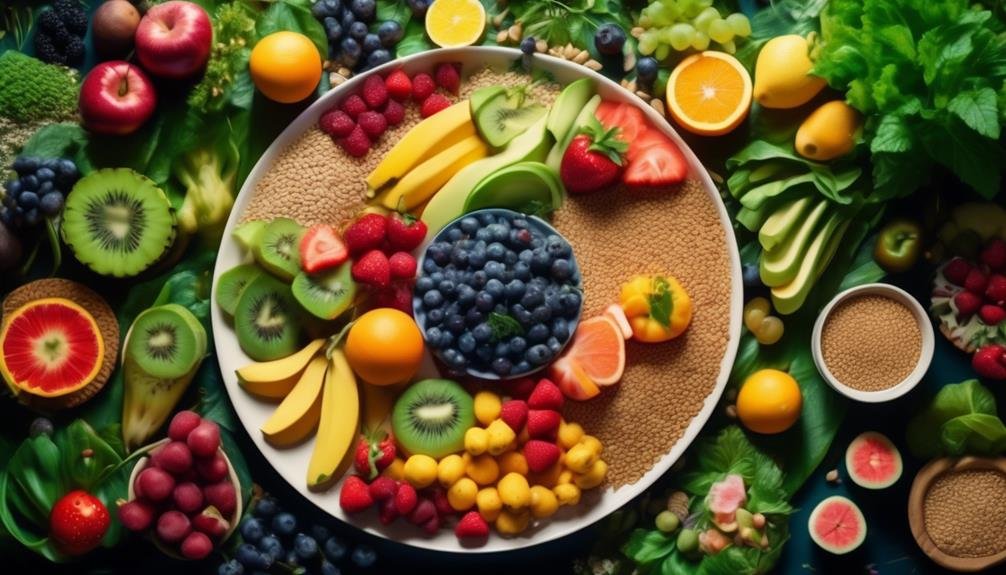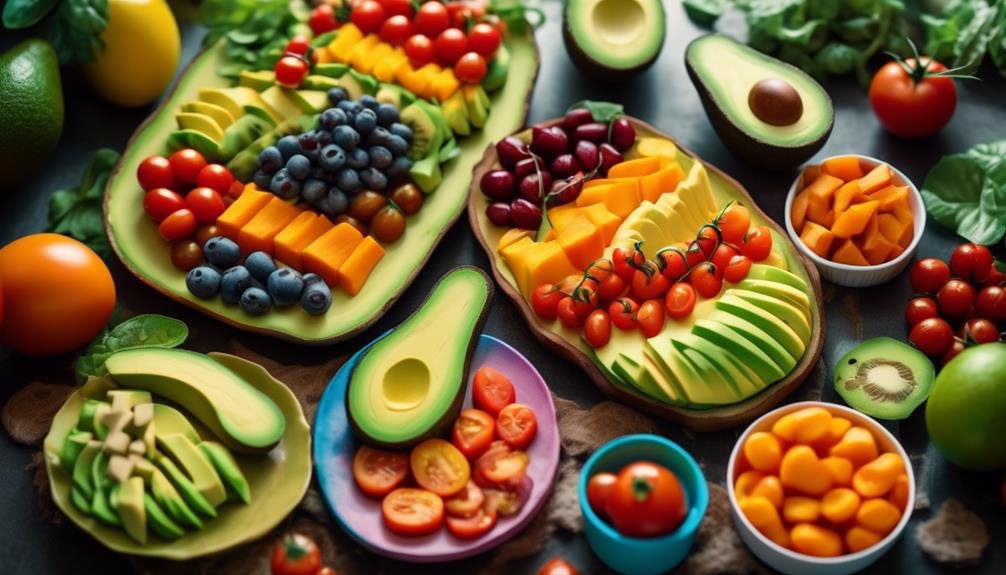"Cherishing Little Steps - A Haven for Baby and Family Journeys"
Sustainable Eating for Kids
Imagine a world where your child's plate not only nourishes their growing bodies but also helps to sustain the planet they'll inherit.
In today's fast-paced and convenience-driven society, it's easy for sustainable eating to take a backseat to processed foods and wasteful habits. But as a parent, you have the power to shape your child's understanding of food and its impact on the environment.
By introducing them to sustainable eating practices from an early age, you can instill in them a sense of responsibility towards the planet, while also setting them up for a healthier future.
So, how can you make sustainable eating a part of your child's life?
Key Takeaways
- Equips children with knowledge and skills for informed choices
- Develops a sense of responsibility towards the environment
- Improved nutrition through consumption of fresh, whole foods
- Reduced risk of chronic diseases like obesity and diabetes
Why Teach Kids About Sustainable Eating

Why should you teach kids about sustainable eating?
The importance of educating children about sustainable eating can't be overstated. By teaching kids about sustainable eating habits, we're equipping them with the knowledge and skills necessary to make informed choices that can have long-term effects on their health, the environment, and the world around them.
Instilling a sense of responsibility towards food and the planet from a young age is crucial. When children understand the importance of sustainable eating, they're more likely to develop healthy habits that can benefit them and the environment in the long run. By teaching them about the impact of their food choices on climate change, deforestation, and water scarcity, we're empowering them to make conscious decisions that contribute to a more sustainable future.
Furthermore, teaching kids about sustainable eating can help them develop a deeper connection with nature and foster a sense of appreciation for the resources that go into producing their food. This can lead to a greater understanding of the value of food, reducing food waste, and promoting mindful consumption.
Benefits of Sustainable Eating for Kids
By understanding the benefits of sustainable eating, children can develop healthier habits that positively impact their well-being and the environment. Teaching kids about sustainable eating not only encourages them to make conscious food choices but also has numerous health implications. Here are four key benefits of sustainable eating for kids:
- Improved nutrition: Sustainable eating promotes the consumption of fresh, whole foods, such as fruits, vegetables, and whole grains. These foods are rich in essential nutrients like vitamins, minerals, and fiber, which are crucial for children's growth and development.
- Reduced risk of chronic diseases: Sustainable eating encourages a balanced diet that's low in processed foods and added sugars. This can help lower the risk of chronic diseases like obesity, heart disease, and type 2 diabetes, which are increasingly prevalent among children.
- Environmental conservation: Sustainable eating focuses on choosing foods that are produced in ways that minimize harm to the environment. By opting for locally sourced, organic, and seasonal produce, children can contribute to reducing greenhouse gas emissions, conserving water, and protecting biodiversity.
- Cultivating food awareness: Sustainable eating teaches children about the origins of their food, the importance of supporting local farmers, and the impact of their food choices on the planet. This knowledge empowers them to become more mindful consumers and advocates for a healthier, more sustainable future.
Understanding Food's Impact on the Environment

Food has a significant impact on the environment, and understanding this connection is essential for promoting sustainable eating habits. One key aspect to consider is food's carbon footprint, which refers to the amount of greenhouse gas emissions produced throughout its entire lifecycle, including production, transportation, and disposal. Certain foods, such as meat and dairy products, have higher carbon footprints compared to plant-based foods. For example, beef production generates significantly more greenhouse gas emissions compared to growing vegetables or legumes. By choosing more plant-based meals, you can reduce your carbon footprint and contribute to a healthier planet.
Another important factor to consider is the use of sustainable farming techniques. Sustainable farming practices focus on minimizing environmental impact while maximizing food production. These techniques include organic farming, which avoids the use of synthetic pesticides and fertilizers, and regenerative agriculture, which aims to restore soil health and biodiversity. By supporting farmers who implement these practices, you're directly contributing to the preservation of ecosystems and reducing pollution caused by conventional farming methods.
Understanding the impact of food on the environment empowers you to make informed choices that align with your desire for sustainability. By opting for plant-based meals and supporting sustainable farming practices, you can play a significant role in reducing greenhouse gas emissions and protecting the earth's resources for future generations.
Choosing Locally Sourced Foods for Kids
Understanding the impact of food on the environment empowers you to make informed choices for your kids, and one crucial aspect to consider is choosing locally sourced foods. Opting for locally sourced foods not only benefits your children's health, but also supports local farmers and reduces the carbon footprint associated with transporting food long distances. Here are four reasons why choosing locally sourced foods is a great choice for your family:
- Fresher and more nutritious: Locally sourced foods are often harvested at their peak ripeness, ensuring maximum freshness and nutritional value. When fruits and vegetables are picked at the right time, they retain more vitamins and minerals, providing your children with the essential nutrients they need to thrive.
- Reduced environmental impact: By purchasing locally sourced foods, you're minimizing the carbon emissions produced by long-distance transportation. Supporting local farmers also helps preserve farmland and promotes sustainable agricultural practices, which are vital for maintaining a healthy environment for future generations.
- Community connection: Choosing locally sourced foods allows you to develop a closer connection with your community. You can visit farmers' markets, meet the farmers who grow your food, and even participate in community-supported agriculture programs. This connection fosters a sense of community and teaches your children about the importance of supporting local businesses.
- Choosing organic options: Many local farmers prioritize sustainable farming practices, including organic methods. By opting for locally sourced organic foods, you can ensure that your children are consuming produce that's free from harmful pesticides and genetically modified organisms (GMOs). This choice not only benefits your family's health but also encourages sustainable farming practices.
Teaching Kids About Seasonal Eating

To instill sustainable eating habits in your children, it is important to teach them about the benefits of seasonal eating. By understanding the concept of seasonal eating, kids can develop a deeper connection to their food and the environment. It also encourages them to appreciate the natural cycles of the Earth and the unique flavors that each season brings. Teaching kids about seasonal eating can be done through various engaging activities and teaching methods.
Here is a table that highlights the benefits of seasonal eating:
| Benefits of Seasonal Eating |
|---|
| 1. Fresher and tastier produce |
| 2. Higher nutritional value |
| 3. Supports local farmers and the local economy |
| 4. Reduces carbon footprint |
| 5. Promotes diverse and balanced diets |
To introduce your children to seasonal eating, you can start by involving them in grocery shopping or visiting local farmers' markets. Encourage them to pick out fruits and vegetables that are in season. You can also plan cooking activities together, where they can help prepare meals using seasonal ingredients. Another fun idea is to create a seasonal eating chart or calendar, where they can track the different foods available in each season.
Reducing Food Waste With Kids
Engaging your children in reducing food waste can be a practical and impactful way to instill sustainable eating habits. By involving kids in the process of creative meal planning, you can teach them the value of minimizing waste while also encouraging their creativity and independence in the kitchen.
Here are four ways you can involve your children in reducing food waste:
- Meal planning together: Sit down as a family and plan meals for the week. Encourage your children to suggest recipes that utilize ingredients you already have at home, reducing the need for unnecessary grocery shopping and minimizing food waste.
- Making use of leftovers: Teach your children how to repurpose leftovers into new meals. For example, leftover roasted chicken can be transformed into sandwiches or added to a salad. This not only reduces waste but also teaches kids how to be resourceful in the kitchen.
- Proper storage and organization: Show your children how to store food properly to extend its shelf life. Teach them about the importance of using airtight containers, labeling leftovers, and keeping the refrigerator organized to prevent food from being forgotten and wasted.
- Composting: Involve your kids in composting food scraps. Teach them about the benefits of composting, such as reducing landfill waste and creating nutrient-rich soil for plants. Encourage them to separate food scraps from other waste and help them maintain a compost bin in your backyard or use a community composting program.
Exploring Plant-Based Options for Kids

Exploring plant-based options can be a nutritious and environmentally-friendly way to introduce kids to a variety of delicious and sustainable foods. Plant-based snacks and meat alternatives are great choices to incorporate into your child's diet. Not only are they packed with essential nutrients, but they also have a lower carbon footprint compared to traditional animal-based products.
Introducing plant-based snacks to your child's diet is a wonderful way to encourage them to eat more fruits, vegetables, and whole grains. These snacks are often rich in fiber, vitamins, and minerals, which are crucial for their growth and development. Some popular plant-based snack options for kids include fresh fruit slices, veggie sticks with hummus, and homemade trail mix with nuts and dried fruits.
When it comes to introducing meat alternatives, there are plenty of options available that mimic the taste and texture of meat without compromising on nutrition. Some examples include plant-based burgers, sausages, and nuggets made from ingredients like soy, beans, or mushrooms. These alternatives not only provide protein but also offer a variety of vitamins and minerals.
To help you incorporate more plant-based options into your child's diet, here is a table showcasing some nutritious and kid-friendly choices:
| Food Category | Plant-Based Options | Nutritional Benefits |
|---|---|---|
| Protein | Lentils, tofu, chickpeas | High in protein, iron, and fiber |
| Calcium | Almonds, broccoli, kale | Good sources of calcium |
| Omega-3 Fatty Acids | Chia seeds, flaxseeds, walnuts | Rich in omega-3 fatty acids |
| Iron | Spinach, quinoa, pumpkin seeds | Excellent sources of iron |
| Vitamin C | Oranges, strawberries, bell peppers | High in vitamin C |
Encouraging Kids to Grow Their Own Food
Encourage your children to develop a green thumb and cultivate their own food for a sustainable and rewarding experience. Gardening activities and outdoor learning can have numerous benefits for kids. Here are four reasons why you should encourage your children to grow their own food:
- Educational opportunities: Growing food provides children with hands-on learning experiences. They can learn about plant life cycles, the importance of soil health, and the impact of weather on plants. Through gardening, they can also develop skills in problem-solving and critical thinking.
- Connection with nature: Gardening allows children to connect with nature and understand where their food comes from. It instills a sense of appreciation for the environment and encourages them to take care of it.
- Healthy eating habits: When children grow their own food, they're more likely to try new fruits and vegetables. They develop a sense of pride and satisfaction in eating what they've grown, leading to healthier eating habits and a greater appreciation for nutritious foods.
- Building life skills: Gardening teaches children responsibility, patience, and perseverance. They learn to care for living things, follow instructions, and take ownership of their actions.
Encouraging kids to grow their own food not only promotes sustainable eating but also provides them with valuable life lessons. So, grab some seeds, gardening tools, and get started on this exciting journey with your children!
Incorporating Sustainable Eating Into Family Meals

To continue promoting sustainable eating habits for your children, now let's explore how you can incorporate these principles into your family meals. Teaching your kids about sustainable food choices can have a lasting impact on their health and the environment.
Here are some practical strategies to involve your kids in sustainable eating at home.
Firstly, include your children in the meal planning process. Discuss the importance of choosing local, seasonal, and organic produce. Take them to farmers markets or community gardens to foster a connection with where their food comes from. Encourage them to help you choose fruits and vegetables that are in season, as this reduces the carbon footprint associated with long-distance transportation.
Next, involve your kids in meal preparation. Give them age-appropriate tasks, such as washing vegetables, stirring ingredients, or setting the table. This not only helps them develop important life skills but also creates a sense of ownership and pride in the meal.
Additionally, make sustainable food choices visible and exciting. Display a variety of colorful fruits and vegetables on the counter, and keep healthy snacks readily available. Get creative with meal presentation by arranging food in fun and appealing ways. By making sustainable eating visually appealing, you can encourage your children to try new foods and make healthier choices.
Finally, use mealtime as an opportunity to discuss the importance of sustainable eating. Talk about the environmental impact of food choices, such as reducing food waste and choosing plant-based options more often. Engage your children in discussions about sustainability and encourage them to ask questions.
Incorporating sustainable eating into your family meals can be an enjoyable and educational experience for everyone involved. By using these teaching strategies and involving your kids in the process, you can instill lifelong habits that benefit their health and the planet.
Frequently Asked Questions
Can Sustainable Eating Help Improve Children's Overall Health and Well-Being?
Sustainable eating can greatly improve your child's overall health and well-being. By focusing on improving their nutrition and reducing the environmental impact, you can ensure a healthier future for them.
How Can Teaching Kids About Sustainable Eating Positively Impact Their Understanding of Food Production?
Teaching kids about sustainable eating positively impacts their understanding of food production. It increases their environmental awareness and helps them develop a connection to nature. They learn how their food choices affect the planet and gain a deeper appreciation for where their food comes from.
Are There Any Negative Effects of Unsustainable Eating Habits on Children's Development?
Are there negative effects of unsustainable eating habits on children's development? Yes, there can be. Poor nutrition from processed foods and lack of exposure to diverse, nutrient-rich foods can hinder growth, cognitive development, and overall health.
What Are Some Practical Tips for Parents to Incorporate Sustainable Eating Into Their Children's Diets?
To incorporate sustainable eating into your child's diet, try these practical tips: opt for seasonal and local produce, choose organic and grass-fed meats, swap processed snacks for homemade ones, and involve your child in meal planning and cooking.
Can Sustainable Eating Habits Help Children Develop a More Positive Relationship With Food?
Sustainable eating habits can positively impact children's mental health and teach them about environmental responsibility. By developing a more positive relationship with food, children can learn to appreciate the impact of their choices on the world around them.
Conclusion
In conclusion, teaching kids about sustainable eating not only benefits their health but also has a positive impact on the environment. By choosing locally sourced and seasonal foods, reducing food waste, and exploring plant-based options, we can create a more sustainable future for our children.
Encouraging them to grow their own food and incorporating sustainable eating into family meals won't only make a difference now but also lay the foundation for a brighter tomorrow.
Let's nourish our kids and the planet together.


